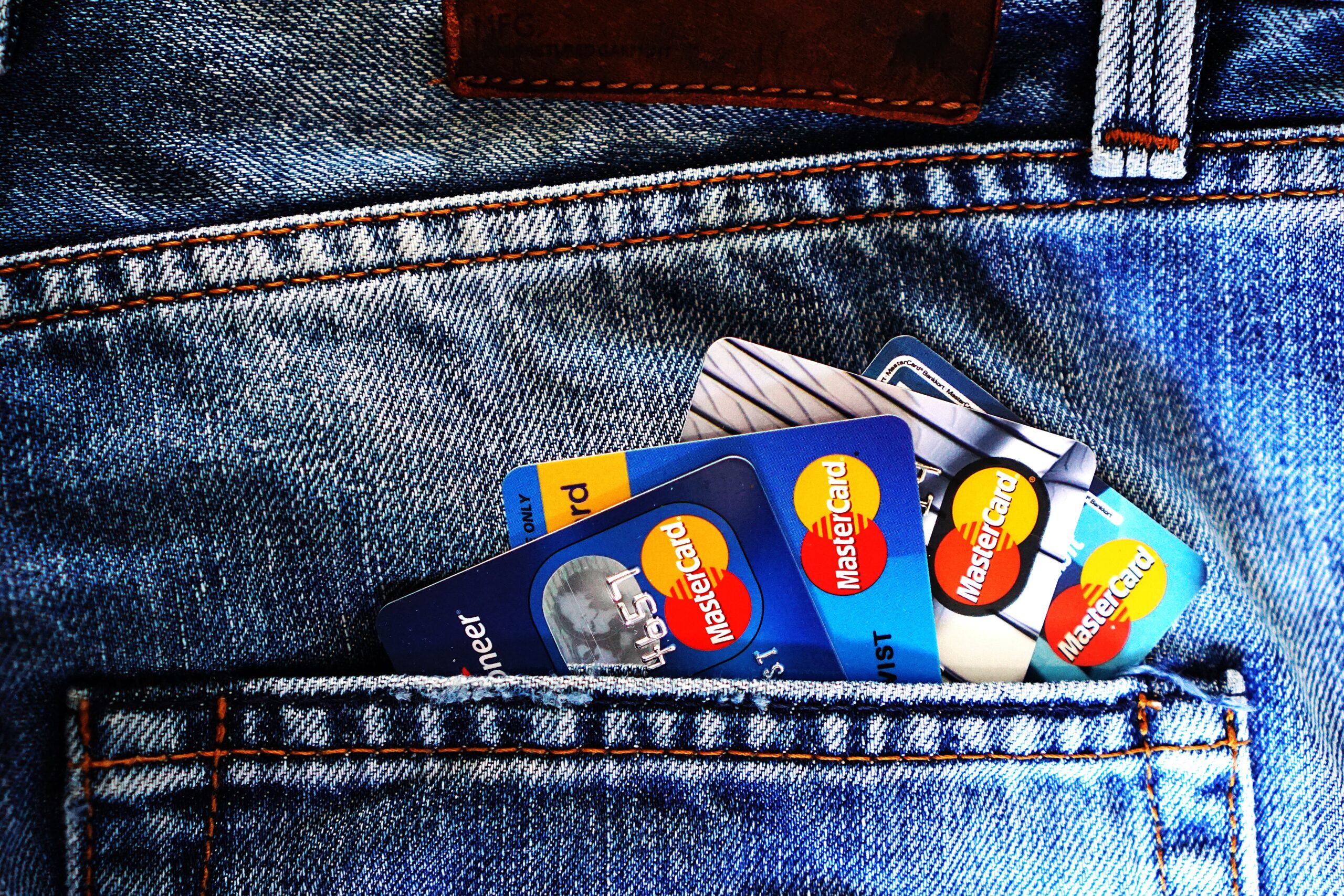

5 Things to STOP if You Want to Pay off Credit Card Debt Faster WITHOUT Spending Less Money
Credit card debt is a pesky burden that many people struggle with no matter how much money they make.
Most people would just say, “It’s easy! Just spend less money!”
But, that is much easier said than done.
You may be surprised to hear that you can get your credit card balances to zero without coming up with the extra money at the end of the month.
Sometimes, the money is actually already there. It’s just going to other financial goals.
I’ll walk you through 5 ways you can shift your money around to pay off your credit card debt even faster BEFORE working on your budget.
(Need help organizing your debt?)
–> For some quick, fun & helpful budgeting tips, follow me on Instagram @familybudgetexpert
Table of Contents
Why pay off credit card debt over other financial goals?
We all know the obvious answer to this question, high interest rates.
But there are other great reasons to get rid of it first, even a balance transfer credit card at 0% or a lower interest debt consolidation loan.
- Free up cash flow going to the minimum payments
- Get rid of interest charges
- Stop the stress of playing catch up while maintaining with your lifestyle
- Spend guilt-free without feeling like your money has to go somewhere “better”
- Focus on long-term wealth building strategies
As you can see, there are financial and non-financial reasons to pay off credit card debt.
Now let’s get into the 5 things to STOP doing so you can get out of debt faster without having to rework your budget
Paying more than the minimum on multiple credit cards
If your plan to pay off credit cards is to pay more than the minimum payments on multiple cards, you might want to rethink that.
The multiple payments might actually be slowing you down.
Focusing on one card at a time is much better mathematically. Plus it helps you sustain your motivation.
The two most popular ways to organize your credit card debt are the Debt Snowball Method and the Debt Avalanche Method.
Both of these methods involve creating a plan for tackling debt, but they differ in terms of which debts should be paid first and how quickly you should attempt to repay them.
At the end of the day though, it’s better to pick one debt repayment strategy and get moving rather than hold off until you pick the “perfect” one.
Debt Snowball Method
The Debt Snowball Method involves paying off your smallest balance cards first while making minimum payments on all other outstanding loans.
This approach works well with those who need motivation as it allows them to get quick wins by knocking out smaller balances more quickly than larger ones.
Plus, by prioritizing one credit card at a time, it frees up those minimum monthly payments at a much faster pace.
Debt Avalanche Method
The Debt Avalanche Method focuses on repaying higher interest balances before lower interest rate loans so that you can reduce how much interest you pay.
This approach works well for financial optimizers who don’t need quick wins to make it to the finish line. It is the mathematically efficient way to pay off debt.
What about a Debt Consolidation Loan?
This is where things can get a little bit tricky.
Debt consolidation is a financial strategy that involves taking out one loan to pay off multiple debts.
It can help simplify your finances by reducing the number of payments you have to make each month, and it typically comes with a lower interest rate than other types of loans.
When you consolidate debt, the money from the new loan is used to pay off your existing debts, leaving you with just one single monthly payment to worry about each month.
Yes, moving high interest debt to a lower interest personal loan can definitely be helpful.
Yes, debt consolidation can be a great way to lower the interest rate and save money while paying back credit card debt.
No, it’s not the cure for credit card debt.
You still need to be committed and find extra money at the month to put towards the debt to get out of it.
Debt consolidation loans can and should be considered, but it’s not the cure for credit card debt.
What about balance transfers?
A 0% balance transfer could be another good way to save money on credit card debt.
By transferring your existing balances to a no interest credit card, you can reduce the amount you pay over time.
However, there is usually a 3% balance transfer fee, so it’s not exactly free money.
Plus, there is a promotional period on most balance transfer cards that expires, so if it’s not paid off in time, the rate skyrockets.
Sure you could do another one, but it won’t exactly help you have a high credit score or live the debt free life.
It can help, but it doesn’t solve the problem at all.
Stop maxing out your retirement plan
Maxing out your retirement plan is a great way to save for the future, but it’s not a great option if you have credit card balances at high interest rates. In fact, it’s really hard to get there if you always have credit card balances.
High interest rates on credit cards will far exceed any return rate earned through investing in a 401(k) or IRA account over the long run. Rather than investing the money, there could be more savings by putting it toward the credit cards.
It’s ok to contribute if your employer will match what you put in. For example, you put in 6% and they will match 3%. In that case, you’re getting a 50% return.
But any contribution above that is not going to be as beneficial as paying off credit card debt.
Slow down your retirement plan contributions to the max employer match, then take the extra take-home pay and put it on your credit cards
Stop college savings & 529 plan contributions
Although the cost of college is rising rapidly, high interest debt like credit card debt will rise even faster than that if it’s not taken care of.
The expected return of college savings will be much lower than the interest on credit card debt. This is a similar reason to why you should pause your retirement plan contributions.
You would pay interest in excess of the long term investment return on your college savings plan.
Even if you live in a state that give you a state tax deduction on your contributions, the math still isn’t as good.
Push the pause button on college savings if you have credit card debt.
Stop your automated savings contributions
While saving money is important for financial security today, if you have credit card debt with high interest rates, you’re actually losing ground if you don’t shift that money toward your credit card debt.
Don’t get me wrong, it’s really important to build up an emergency fund and cash cushion, but you won’t build your wealth or reach your financial goals nearly as fast.
Let’s say someone has a high yield savings account at 3% but also has $20,000 of credit card debt at 20% making the minimum monthly payment.
If they decide to save $1,000 instead of paying off adding $1,000 to their minimum payment, it could be costly.
That’s $12,000 of 20% credit card debt that could have been paid off. The cost of NOT doing it? $2,400 in extra interest.
The $12,000 in a high interest savings would yield “only” $360 in interest. That’s a net negative $2,050!
It’s better to pay off the credit card debt.
Stopping automated savings may be difficult because you may feel like you’re losing a sense of security. but doing so will ensure that more of your hard-earned money is going towards eliminating the highest interest rate debts.
Stop making IRA contributions
We like IRAs because they allow our money to grow tax-free. Do you know how else you can grow your wealth tax-free?
Paying off debt! Here’s how it works:
Remember how the interest rate on your debt is like giving the bank that return on their investment? Well debt paid off is essentially buying back that investment from them.
So if you pay off an extra $10,000 of credit card debt at 20%, you are earning that 20% back. That’s your investment return.
But unlike investing, it’s a risk-free, immediate return on investment and yes…it’s tax-free too!
Pay down your high interest debts before contributing to your retirement plan.
Other benefits of paying off your credit cards first
Alongside the investment return, there are other benefits that come along when you pay off a credit card. These are definitely cause to celebrate!
You free up cash flow and lower your required expenses
Even if you use the debt snowball, debt avalanche, or another debt repayment method where you roll monthly payments to the next debt once it’s paid off, you still free up the required payment.
If you fall on hard times, you can take your foot of the pedal for a little bit.
*This is not the case if you consolidate debt into a personal loan. You have to pay off the entire loan before you see any cash flow relief.
It reduces stress
Credit card debt is stressful!
The idea of having to play catch up while also maintaining your current living expenses can take up a bunch of emotional reserves.
Any chance you have to get rid of it as fast as you can will feel like a weight lifted off your shoulders.
It will boost your credit score
I’ll be honest, I don’t love the credit score but I know it’s a necessary evil, and paying off credit card debt is one of the most effective ways to boost your credit score.
When you reduce or pay off a balance, it reduces the amount of money that you owe and increases your available credit – both of which will help raise your overall score.
Paying down high balances will also lower your utilization ratio, which measures how much debt you’re carrying relative to your total available credit limit.
Lower utilization ratios can have a positive effect on your score.
But in the end, getting out of debt just feels good regardless of if it makes you have good credit or not.
It simplifies your life
The less complexity in life, the better, especially for busy families.
Having multiple credit cards that you’re paying on makes life more complicated when it doesn’t have to be.
Stop doing these 5 things and you’ll build your wealth FASTER
When you pause most of your automated savings and investment contributions, and instead prioritize your debt reduction strategies, you will get to your destination much faster.
You’ll be much better off if you prioritize paying off high interest debt rather than investing in retirement, college savings plans, IRAs.
While saving money is definitely important, the return on investment of eliminating your credit card debt will be much higher than any other form of saving or investing you could do.
Plus it will free up your cash flow.
Automated savings contributions should be stopped so more of your hard-earned cash can go towards reducing that debt.
With a little bit of discipline and focus, it won’t take long for you to see the rewards from getting rid of those pesky debts – freeing up money each month and increasing your wealth at an accelerated rate!
What else can you do to pay off your debt faster?
The number one thing you can do is find a way to have more money left over at the end of the month.
The 5 things to stop doing are ways you can pay off your debt quickly without having to spend less money.
BUT that will only get you so far. Eventually, you’ll need to work on your budget.
I’m here to help!
You can get my free guide: 5 Steps to Cut Spending right here.
Also, I offer a free 30 minute call if you want to talk through this together.
Follow me on Instagram @familybudgetexpert if you want more helpful tips to save more, argue less & keep the fun.




